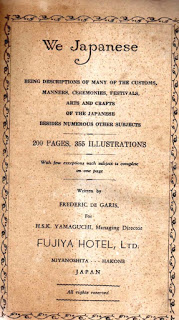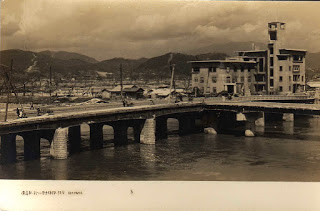
To mark the terrible events of seventy years ago in Hiroshima and Nagasaki, here are some postcards bought by my late father while visiting Japan, late in 1946 or early in 1947, as a commander in the Royal Navy. They were found interleaved in the first volume of a two volume guide book entitled
We Japanese, first published in December 1934 and June 1937,by H.S.K Yamaguchi, the managing director of the exclusive Fujiya Hotel at Miyanoshita, situated in the mountainous region of Hakone, eighty miles SW of Tokyo.

The first and second volumes of this four hundred page guide to ‘many of the customs, manners, ceremonies, festivals, arts and crafts of the Japanese’ were reprinted in October and December respectively. A third and final volume appeared in 1949. My father probably bought his copies while staying at the hotel, which was established in 1878 by a member of the Yamaguchi family, and today advertises itself as the oldest ‘Western-style’ hotel in Japan. He wouldn’t have met the guide’s author, who had made great improvements to his hotel in the thirties, because he had died in 1944, but he might have rubbed shoulders with some of its famous guests. During the war one of these was the loathsome ‘Butcher of Warsaw’, Joseph Meisinger, but he had been captured by the Allies in September 1945. At other times celebrities staying at this exclusive hotel included Archduke Franz Ferdinand, Charlie Chaplin, and the Emperor of Japan himself. In 1978 Yoko Ono took John Lennon here.
Today, at £133 pp per night, the Fujiya Hotel no doubt trades on its exclusive reputation, but it is still cheaper than a less famous rival nearby. If you do decide to visit it, the receptionist may let you consult the final issue (1950) of the guide to Japan that my father bought nearly seventy years ago. [RMH]





